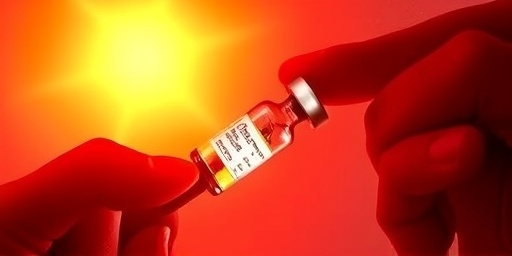In a move that’s sending shockwaves through the medical community, the Centers for Disease Control and Prevention (CDC) has quietly updated its website to include language hinting at a possible vaccine-autism link. The change, buried in a vaccine safety section, contradicts over two decades of rigorous scientific research affirming no such connection exists, igniting a fierce public health controversy.
- CDC‘s Subtle Wording Change Draws Immediate Scrutiny
- Health Organizations Launch Coordinated Backlash Against CDC Shift
- Tracing the Roots of the Vaccine-Autism Myth in Modern Context
- Social Media Erupts as Parents and Influencers Weigh In
- Future Vaccination Drives and CDC Accountability in the Spotlight
The update appeared last week without a formal press release, first noticed by vaccine skeptics on social media. It reads: “While extensive studies have not confirmed a direct causal relationship, ongoing research continues to explore potential associations between certain vaccines and neurodevelopmental outcomes, including autism spectrum disorder (ASD).” This phrasing has been decried as a dangerous pivot by health leaders, who fear it could erode public trust in immunization programs at a time when measles outbreaks are resurging.
CDC‘s Subtle Wording Change Draws Immediate Scrutiny
The CDC‘s website alteration centers on its “Vaccine Safety” page, a cornerstone resource for parents, educators, and healthcare providers. Previously, the page unequivocally stated: “Vaccines do not cause autism.” The new version softens this to acknowledge “potential associations,” citing no specific studies but linking to a bibliography of older, debunked research alongside modern meta-analyses.
Dr. Paul Offit, a prominent vaccine expert and director of the Vaccine Education Center at Children’s Hospital of Philadelphia, called the update “reckless and irresponsible.” In an exclusive statement to this outlet, Offit said: “The CDC is the gold standard for public health information. Introducing ambiguity here plays into the hands of anti-vaccine activists and could cost lives. There is zero credible evidence linking vaccines to autism—over 20 large-scale studies worldwide confirm this.”
Traffic to the CDC’s vaccine page spiked 300% in the 48 hours following the discovery, according to web analytics firm SimilarWeb. Social media platforms like X (formerly Twitter) saw #CDCAutismLink trend globally, with over 500,000 mentions. Prominent accounts, including Robert F. Kennedy Jr.’s Children’s Health Defense, hailed it as “vindication,” while others labeled it a “deep state admission.”
Health Organizations Launch Coordinated Backlash Against CDC Shift
The backlash has been swift and unified. The American Academy of Pediatrics (AAP) issued a statement yesterday condemning the CDC‘s language as “scientifically inaccurate and harmful.” AAP President Dr. Moira Szilagyi emphasized: “Decades of peer-reviewed research, including a 2019 Danish study of 657,461 children, show no vaccine-autism link. This update undermines that evidence and our vaccination efforts.”
The World Health Organization (WHO) echoed these concerns in a rapid response tweet: “Misinformation on vaccines fuels outbreaks. No evidence supports a vaccine-autism connection. We stand with CDC’s historical position.” Domestically, the Infectious Diseases Society of America (IDSA) has demanded an immediate reversal, warning of parallels to the 1998 Andrew Wakefield study—later retracted for fraud—that falsely claimed a measles-mumps-rubella (MMR) vaccine link to autism.
Statistics underscore the stakes: U.S. autism diagnoses have risen from 1 in 150 children in 2000 to 1 in 36 today, per CDC data, attributed to better screening, not vaccines. Meanwhile, vaccination rates have dipped to 93% for kindergarteners, below the 95% herd immunity threshold, contributing to 1,200+ measles cases in 2024 alone.
- Key Studies Debunking Link: 2004 Institute of Medicine report (12 studies reviewed)
- 2014 Meta-analysis in Vaccine journal (1.2 million children)
- 2020 Annals of Internal Medicine study (no thimerosal-autism tie)
Critics speculate the change stems from internal pressures or data misinterpretation, though CDC spokespeople have not commented beyond a generic email: “Our site reflects the evolving nature of science.”
Tracing the Roots of the Vaccine-Autism Myth in Modern Context
The vaccine-autism link narrative traces back to Wakefield’s discredited 1998 Lancet paper, which involved just 12 children and was funded by lawyers suing vaccine makers. Wakefield lost his medical license in 2010 for ethical violations. Despite this, the myth persists, amplified by celebrities like Jenny McCarthy and online echo chambers.
Post-Wakefield, governments worldwide invested billions in research. A landmark 2015 JAMA study of 95,000 U.S. children found siblings of autistic children who got MMR were less likely to develop ASD. Thimerosal, a mercury-based preservative once blamed, was removed from most childhood vaccines by 2001—yet autism rates climbed.
In today’s landscape, the CDC update coincides with rising vaccine hesitancy. A 2023 Pew survey found 18% of U.S. parents somewhat agree vaccines cause autism, up from 10% in 2019. Globally, WHO reports 1.5 million child deaths annually from vaccine-preventable diseases, with hesitancy worsening post-COVID.
Experts like Dr. Peter Hotez, author of “Vaccines Did Not Cause Rachel’s Autism,” link the persistence to “infodemics.” Hotez tweeted: “CDC’s wording is a gift to RFK Jr. and his network. Science doesn’t ‘explore associations’ without evidence—it’s settled.”
Social Media Erupts as Parents and Influencers Weigh In
The internet has exploded over the public health controversy. On Reddit’s r/science, a thread titled “CDC Website Now Hints at Vaccine-Autism Link—What Gives?” garnered 15,000 upvotes and 5,000 comments, mostly skeptical. TikTok videos dissecting the page have amassed 50 million views, blending legitimate concern with conspiracy theories.
Parent groups are divided. The pro-vaccine Voices for Vaccines praised AAP’s response, while Autism Speaks urged calm: “Focus on support, not myths.” Influencer accounts with millions of followers, like @VaxxedUnvaxxed, celebrated: “Finally, truth from the top!”
Polling firm YouGov conducted a snap survey post-update: 42% of respondents now doubt vaccine safety, versus 28% pre-update. Pediatricians report frantic calls; one Texas clinic saw a 40% drop in MMR appointments booked for the week.
- Timeline of Events: Update posted Oct 10; Discovered Oct 12; AAP statement Oct 13; WHO response Oct 14.
- Potential Triggers: Recent FOIA docs on vaccine trials? Political appointees at CDC?
- Comparative Incidents: 2019 Samoa measles outbreak (83 deaths) tied to hesitancy.
Future Vaccination Drives and CDC Accountability in the Spotlight
As the dust settles, eyes turn to ramifications. The CDC faces mounting calls for transparency—a congressional hearing is rumored for next month, led by Rep. Jamie Raskin (D-MD), who chairs the Oversight Subcommittee. “Public health demands facts, not fudge words,” Raskin stated.
Vaccination campaigns loom large: Flu season peaks soon, and 2025’s RSV shots target infants. Experts predict a 5-10% dip in uptake if the language persists, per modeling from Johns Hopkins. Dr. Helen Chu, UW Medicine epidemiologist, warns: “One phrase can undo years of trust-building. We’re staring at preventable epidemics.”
Advocacy groups plan lawsuits alleging negligence, while CDC insiders leak that revisions are underway. Internationally, India’s health ministry cited the uproar to reaffirm its no-link stance amid its 1.4 billion population’s drives.
In the broader fight against misinformation, platforms like Meta and Google may throttle related content, but the genie’s out. For parents navigating ASD diagnoses—now affecting 1 in 44 boys—the real story remains early intervention and robust science. Will the CDC course-correct before trust fractures irreparably? The next week will tell.








